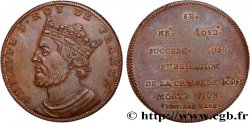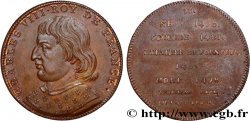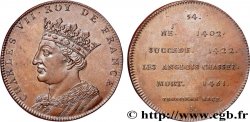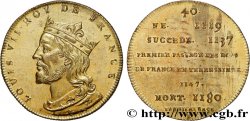E-auction 656-676967 - METALLIC SERIES OF THE KINGS OF FRANCE Règne de HUGUES CAPET - 35 - refrappe ultra-moderne
You must signin and be an approved bidder to bid, LOGIN TO BID. Accounts are subject to approval and the approval process takes place within 48 hours. Do not wait until the day a sale closes to register. Clicking on « bid » constitutes acceptance of the terms of use of cgb.fr private e-auctions.
Bids must be placed in whole Euro amounts only. The sale will start closing at the time stated on the item description; any bids received at the site after the closing time will not be executed. Transmission times may vary and bids could be rejected if you wait until the last second. For further information ckeck the E-auctions F.A.Q.
NO BUYER'S FEE.
NO BUYER'S FEE.
Type : Règne de HUGUES CAPET - 35 - refrappe ultra-moderne
Date: n.d.
Metal : silver plated bronze
Diameter : 34 mm
Orientation dies : 12 h.
Weight : 20,87 g.
Edge : cannelée
Puncheon : corne d’abondance
Coments on the condition:
Patine hétérogène avec des traces de rayures et de manipulation
Obverse
Obverse legend : HUGUES CAPET ROY DE FRANCE.
Obverse description : Buste imaginaire couronné et drapé à droite.
Reverse
Reverse legend : 35. / NÉ. 941*. / COURONNÉ. 987. / RETABLISSEMENT DE LA / DISCIPLINE ECCLESIASTIQUE. / MORT 996. / COMMENCEMENT DE LA / TROISIEME RACE. / P..
Reverse description : Légende en 9 lignes et corne d’abondance à l’exergue.
Commentary
Médaille conservée sous capsule. Refrappe ultra-moderne des séries de jetons.
Hugues Capet (né vers 940, mort au lieu-dit « Les Juifs », près de Prasville (Eure-et-Loir) le 24 octobre 996), duc des Francs (960-987), puis roi des Francs (987-996), fut le premier souverain de la dynastie capétienne. Fils de Hugues le Grand et de son épouse Hedwige de Saxe, il est l'héritier des puissants Robertiens, la lignée qui est en compétition pour le pouvoir avec la dynastie carolingienne et les grandes familles aristocratiques de Francie aux IXe et Xe siècles.
La fin du Xe siècle connaît le début d'une révolution économique et sociale qui allait trouver son apogée vers 1100 Les progrès agricoles, le début des défrichements et l'augmentation des capacités d'échanges entraînée par l'introduction du denier d'argent par les premiers Carolingiens, entraînent une dynamique économique encore timide mais réelle. Dans le même temps, la fin des invasions et la continuité des guerres personnelles entraînent la construction des premiers châteaux privés où peuvent trouver refuge les paysans. En parallèle, la nouvelle élite guerrière, les chevaliers, entre en concurrence avec l'ancienne aristocratie foncière carolingienne. Pour canaliser ces nouveaux venus et pour assurer la protection de leurs biens, l'aristocratie et l'Église soutiennent et exploitent le mouvement de la paix de Dieu. C'est dans ce contexte qu'Hugues Capet peut instaurer la dynastie capétienne.
Pour la suite de la biographie, voir http://fr.wikipedia.org/wiki/Hugues_Capet.
Medal preserved in a capsule. Ultra-modern restriking of the token series.
Hugh Capet (born around 940, died at the place called \\\"Les Juifs\\\", near Prasville (Eure-et-Loir) on October 24, 996), Duke of the Franks (960-987), then King of the Franks (987-996), was the first sovereign of the Capetian dynasty. The son of Hugh the Great and his wife Hedwig of Saxony, he was the heir of the powerful Robertians, the lineage that competed for power with the Carolingian dynasty and the great aristocratic families of Francia in the 9th and 10th centuries..
The end of the 10th century saw the beginning of an economic and social revolution that would reach its peak around 1100. Agricultural progress, the beginning of land clearing, and the increased trading capacity brought about by the introduction of the silver denarius by the early Carolingians led to a still tentative but real economic dynamism.. At the same time, the end of invasions and the continuation of personal wars led to the construction of the first private castles where peasants could find refuge.. At the same time, the new warrior elite, the knights, entered into competition with the old Carolingian landed aristocracy. To control these newcomers and ensure the protection of their property, the aristocracy and the Church supported and exploited the Peace of God movement.. It is in this context that Hugh Capet was able to establish the Capetian dynasty..
For the rest of the biography, see http://fr. Wikipedia. org/wiki/Hugues_Capet
Hugues Capet (né vers 940, mort au lieu-dit « Les Juifs », près de Prasville (Eure-et-Loir) le 24 octobre 996), duc des Francs (960-987), puis roi des Francs (987-996), fut le premier souverain de la dynastie capétienne. Fils de Hugues le Grand et de son épouse Hedwige de Saxe, il est l'héritier des puissants Robertiens, la lignée qui est en compétition pour le pouvoir avec la dynastie carolingienne et les grandes familles aristocratiques de Francie aux IXe et Xe siècles.
La fin du Xe siècle connaît le début d'une révolution économique et sociale qui allait trouver son apogée vers 1100 Les progrès agricoles, le début des défrichements et l'augmentation des capacités d'échanges entraînée par l'introduction du denier d'argent par les premiers Carolingiens, entraînent une dynamique économique encore timide mais réelle. Dans le même temps, la fin des invasions et la continuité des guerres personnelles entraînent la construction des premiers châteaux privés où peuvent trouver refuge les paysans. En parallèle, la nouvelle élite guerrière, les chevaliers, entre en concurrence avec l'ancienne aristocratie foncière carolingienne. Pour canaliser ces nouveaux venus et pour assurer la protection de leurs biens, l'aristocratie et l'Église soutiennent et exploitent le mouvement de la paix de Dieu. C'est dans ce contexte qu'Hugues Capet peut instaurer la dynastie capétienne.
Pour la suite de la biographie, voir http://fr.wikipedia.org/wiki/Hugues_Capet.
Medal preserved in a capsule. Ultra-modern restriking of the token series.
Hugh Capet (born around 940, died at the place called \\\"Les Juifs\\\", near Prasville (Eure-et-Loir) on October 24, 996), Duke of the Franks (960-987), then King of the Franks (987-996), was the first sovereign of the Capetian dynasty. The son of Hugh the Great and his wife Hedwig of Saxony, he was the heir of the powerful Robertians, the lineage that competed for power with the Carolingian dynasty and the great aristocratic families of Francia in the 9th and 10th centuries..
The end of the 10th century saw the beginning of an economic and social revolution that would reach its peak around 1100. Agricultural progress, the beginning of land clearing, and the increased trading capacity brought about by the introduction of the silver denarius by the early Carolingians led to a still tentative but real economic dynamism.. At the same time, the end of invasions and the continuation of personal wars led to the construction of the first private castles where peasants could find refuge.. At the same time, the new warrior elite, the knights, entered into competition with the old Carolingian landed aristocracy. To control these newcomers and ensure the protection of their property, the aristocracy and the Church supported and exploited the Peace of God movement.. It is in this context that Hugh Capet was able to establish the Capetian dynasty..
For the rest of the biography, see http://fr. Wikipedia. org/wiki/Hugues_Capet








 Report a mistake
Report a mistake Print the page
Print the page Share my selection
Share my selection Ask a question
Ask a question Consign / sell
Consign / sell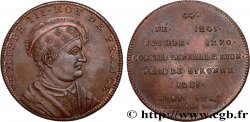
 Full data
Full data
